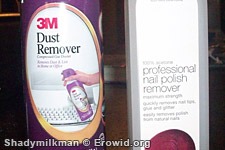Inhalants

COMMON & BRAND NAMES
Gasoline; Acetone; Mineral Spirits; Freon; Computer Duster; Glue
EFFECTS CLASSIFICATION
Anaesthetic; Intoxicant; Dissociative
CHEMICAL NAME
Various
DESCRIPTION
Inhalants are either chemicals in gaseous form or volatile solvents (liquids) that becomes gas at the time of use, which are inhaled by people for their psychoactive effects.
CAUTION
Our understanding of the literature is that there is no such thing as safe use of most volatile solvents, aerosols or other street inhalants : their psychoactive effects may be inseparable from nerve and organ damage.
GENERAL INFORMATION #
HISTORY #
HEALTH #
ASK EROWID ANSWERS #
RESEARCH & JOURNAL ARTICLES #
Comparison of the effects of gaseous and volatile anesthetics - Drug Alcohol Dep, 2005
EXPERIENCES #
A Corrupted Blank Slate, by Gary UK
As the Spirit Wanes the Form Appears, by Gangleri
Don't Use Inhalants!, by Glad2beAlive
A Very Eerie Sensation of Uncertainty, by Zarko
BOOKS #
The Encyclopedia of Psychoactive Drugs: Inhalants, by J. Glowa
Solvent Neurotoxicity, by P. Arlien-Søborg
Chloroform: The Quest for Oblivion, by Linda Stratmann
OFF-SITE RESOURCES
SECONDARY RESOURCES #
Is Jenkem for Real? (no), Ask Erowid, Nov 2007
HISTORY #
MEDIA COVERAGE #
19-year-old dies after inhaling deodorant spray to get high - CNN.com, Nov 16, 2018
Youth with Mental Illness, Brain Injury More Likely to Use Inhalants - PsychCentral, Oct 15 2015
The new gay popers are deliriously risky - Project Q, Jan 27 2015
Vision: A Quick High for Sex May Damage Vision - NY Times, Oct 18 2010
Kids finding trouble in home cabinets, garages - LA Daily, Dec 2005



